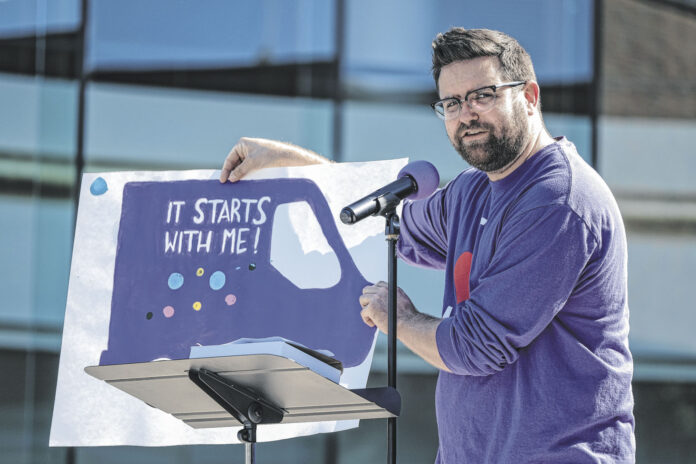
Bartholomew County men are being asked to step forward and publicly denounce acts of dating and domestic violence.
Sponsored by Turning Point Domestic Violence Services, the ninth annual “Men Take a Stand” event will be held from noon until 1 p.m. on Wednesday, Oct. 20, in front of Columbus City Hall.
Men are invited to attend and lead by example to promote and model healthy relationships to colleagues, peers and local youth, Turning Point officials said.
One highlight will be the presentation of the Stand Up 2021 Award, event co-organizer and prevention team leader Austin Lewis said.
This award goes to a community member who is outspoken against domestic violence and has demonstrated a strong relationship with the Turning Point organization, Lewis said.
For many, it’s difficult to understand why any person wouldn’t take a stand against willful intimidation, physical assault, battery, sexual assault, or other abusive behavior perpetrated by one intimate partner against another.
Domestic violence has become somewhat of a political hot potato, largely due to a 27-year-old federal act that funds investigations and prosecutions of violent crimes against women.
A few months after the 1994 Violence Against Women Act expired in 2019, the U.S. House of Representatives voted to renew the legislation written by President Joe Biden when he was a U.S. senator.
But for the past two years, the bill has been stalled in the Senate reportedly over GOP concerns regarding new provisions that protect transgender victims and ban individuals convicted of domestic abuse from purchasing firearms.
When asked about this partisan divide, Turning Point Executive Director Lisa Shafran first said she does not agree with some of the political bickering as to which gender is more “at fault” for domestic violence.
“As an agency, we would take issue with somebody saying men are the problem,” Shafran said. “We all know the majority of survivors are women, but I think there are also a lot of male survivors who are just less likely to come forward.”
According to data collected by the National Coalition Against Domestic Violence, 23.2% of women and 13.9% of men have experienced severe physical violence by an intimate partner during their lifetime.
But at the same time, coalition statistics show female victims sustain three times more injuries than male victims, and are four times more likely to require medical care.
While “Men Take a Stand” is an annual one-day event where males are asked to serve as role models, Shafran says the ultimate goal is to make Columbus a community that doesn’t tolerate violence in any form.
Reaching that goal is every resident’s responsibility, so both males and females should never dismiss an act of violence they witness because it’s “none of their business,” she said.
Although Shafran says Turning Point would never ask a bystander to step into a situation that might endanger them, she strongly urges all residents to do the right thing – even if it’s just reporting the abuse over the phone.
“The tag line is always ‘if you see something, say something’,” Shafran said.




